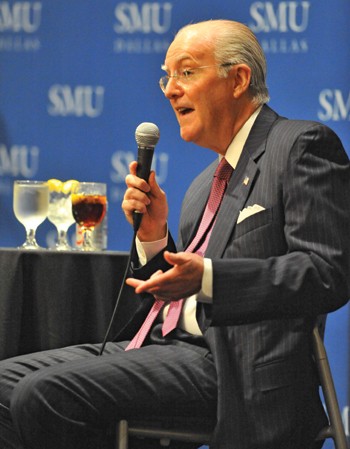
U.S. Ambassador to the People’s Republic of China Clark T. Randt, Jr., answers a student’s question yesterday afternoon at the Turner Construction/Wachovia Student Forum in Hughes-Trigg. (Stuart Palley)
The partnership between the U.S. and the People’s Republic of China is “the most important bilateral relationship in the world,” according to the U.S. ambassador to China, Clark T. Randt, Jr.
“China has and will continue to have a tremendous impact on our lives,” he said.
Randt has been the ambassador to China since his appointment by President Bush in 2001 and has worked in the country for more than 30 years. He spoke about U.S.-China relations at the Gregg and Molly Engles Lecture as part of the Willis M. Tate Lecture Series on Tuesday night.
Randt first went to China in 1974. He recalled being awoken by loud speakers proclaiming, “reactionaries are all paper tigers.” Randt said he would practice his Chinese on unsuspecting citizens who would then run away because he was a foreigner.
“We’ve come a long way,” he said. “Things have changed.”
Randt said the past 30 years have seen the emergence of China in the world, with the nation becoming the second largest energy consumer and the largest polluter in the world. 2008, in particular, has “been a year of triumph and tragedy,” as Chinese citizens dealt with a major earthquake that left 5 million homeless and the hosting of the Olympic games in Beijing.
Earthquakes were once a government secret, according to Randt. Now, government response has led to increased openness with the world. In addition, “the success of the Olympic games gave the people of China a justified morale boost.”
Randt acknowledged that the U.S. was disappointed China did not use the games as an opportunity for increased tolerance and openness. But, he said, the games allowed Americans to learn about the Chinese and the Chinese to learn about the world.
Randt characterized the relationship between the U.S. and China as mature and complex, saying that while we have similar interests, our differences create challenges.
“We respect China as a great nation,” he said, “and we respect the Chinese as a great people.” Randt said increased openness and tolerance in China would lead to an “even greater, more respected China.”
Randt noted that under the Bush administration, dialogues on human rights and religious freedom have restarted after a long hiatus.
In addition, China has played a critical role in six party talks and is promoting a denuclearized Korean peninsula.
“We wouldn’t have come this far without the support from China,” Randt said.
However, while China continues to support U.S. policies of nuclear disarmament, it continues to trade with Iran, a country who has promoted the use of nuclear weapons.
In addition to political issues, Randt discussed the economical issues between the U.S. and China. He noted that the U.S. now has a $256 billion trade deficit with China, a deficit that is three times as large as the deficit with Japan.
While this deficit undermines the relationship between the two countries, Randt doesn’t believe that the U.S. should throw barriers in the way of U.S.-Chinese trade. Instead, he says the U.S. should push for openness in China.
“Each of you has success in this relationship,” Randt said. “How we deal with China today will impact the world that our children will inherit tomorrow.”








